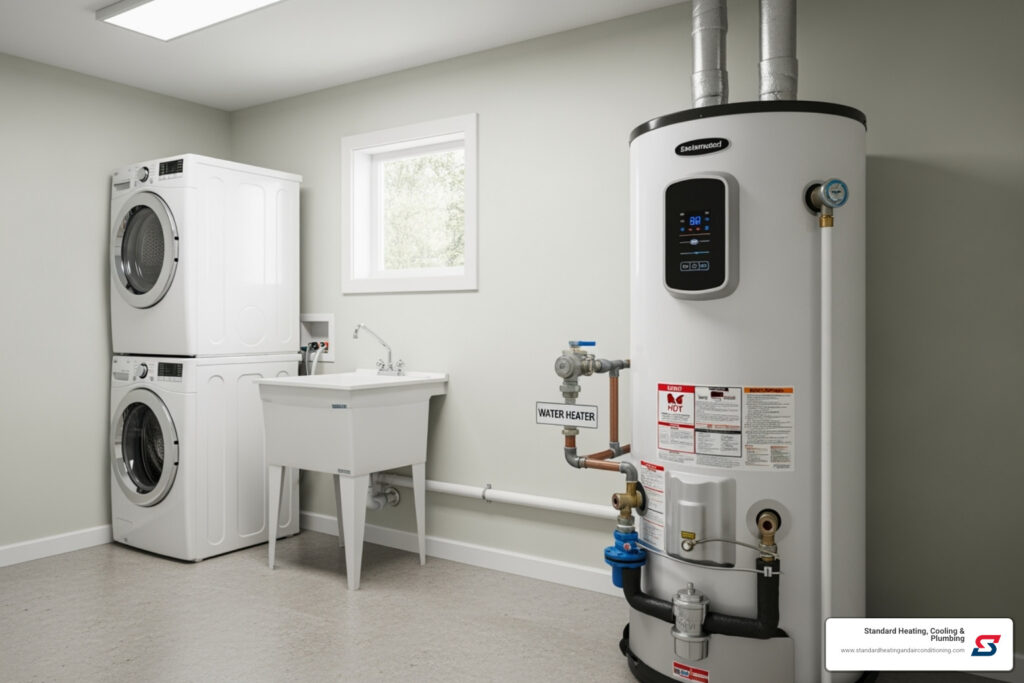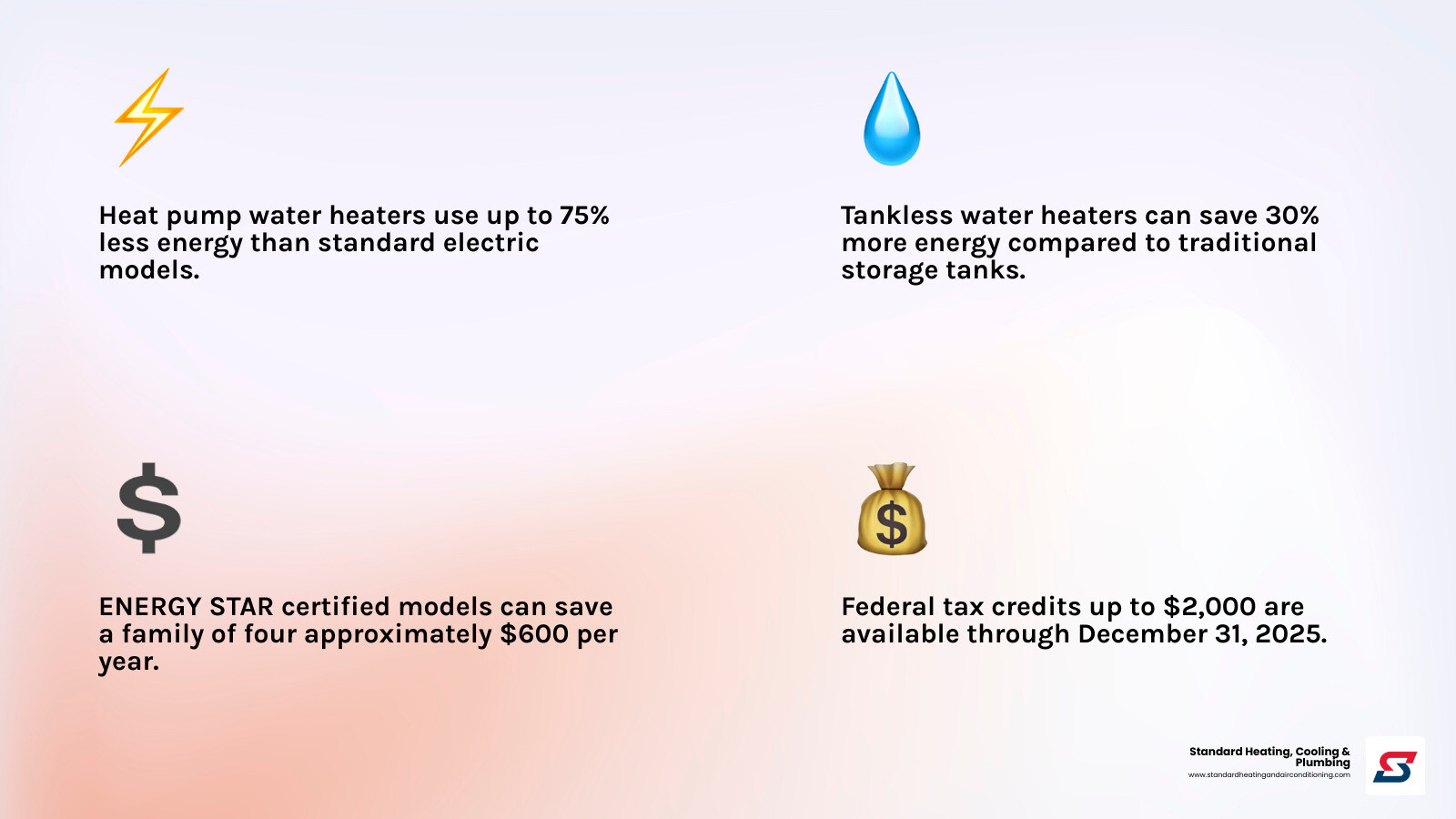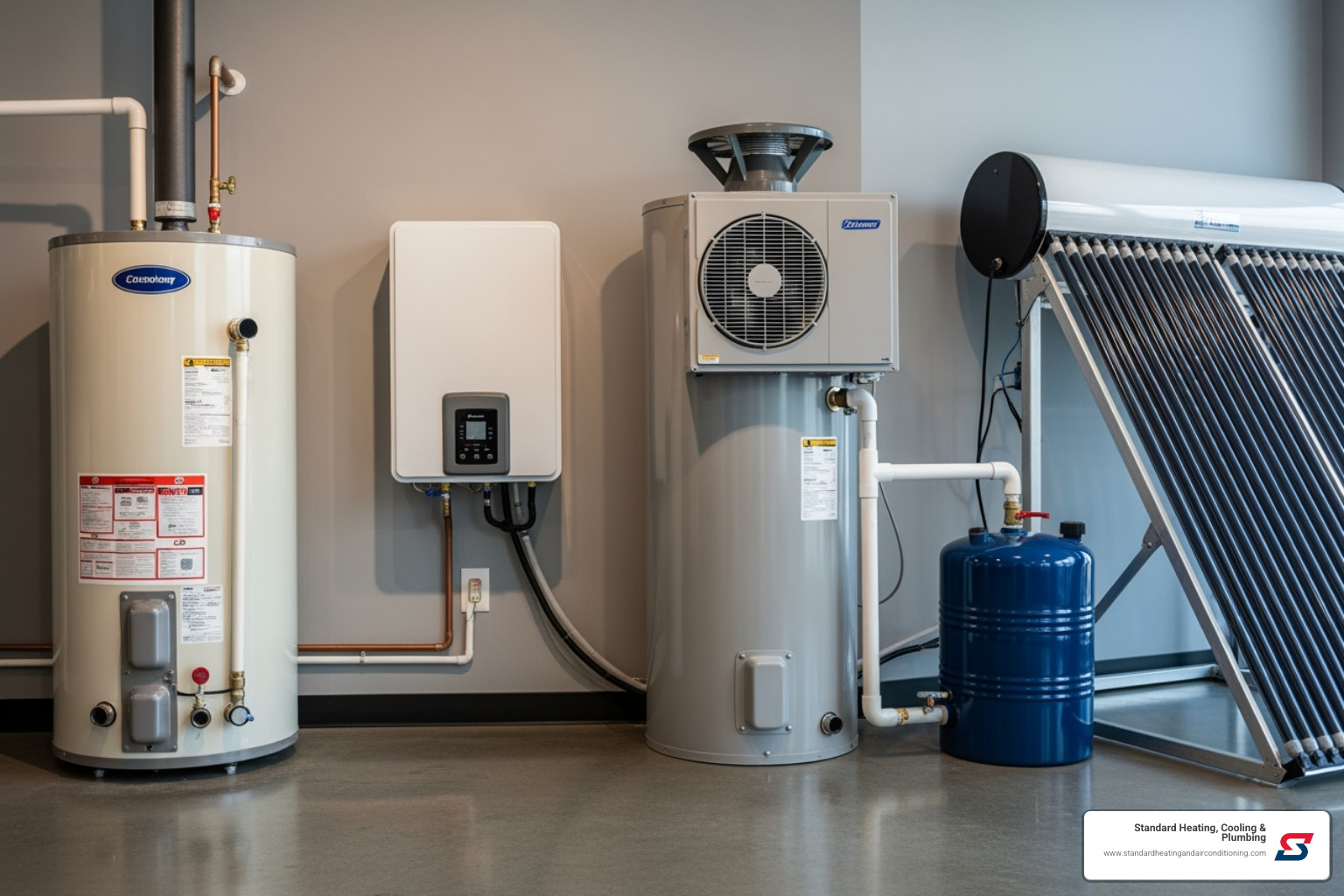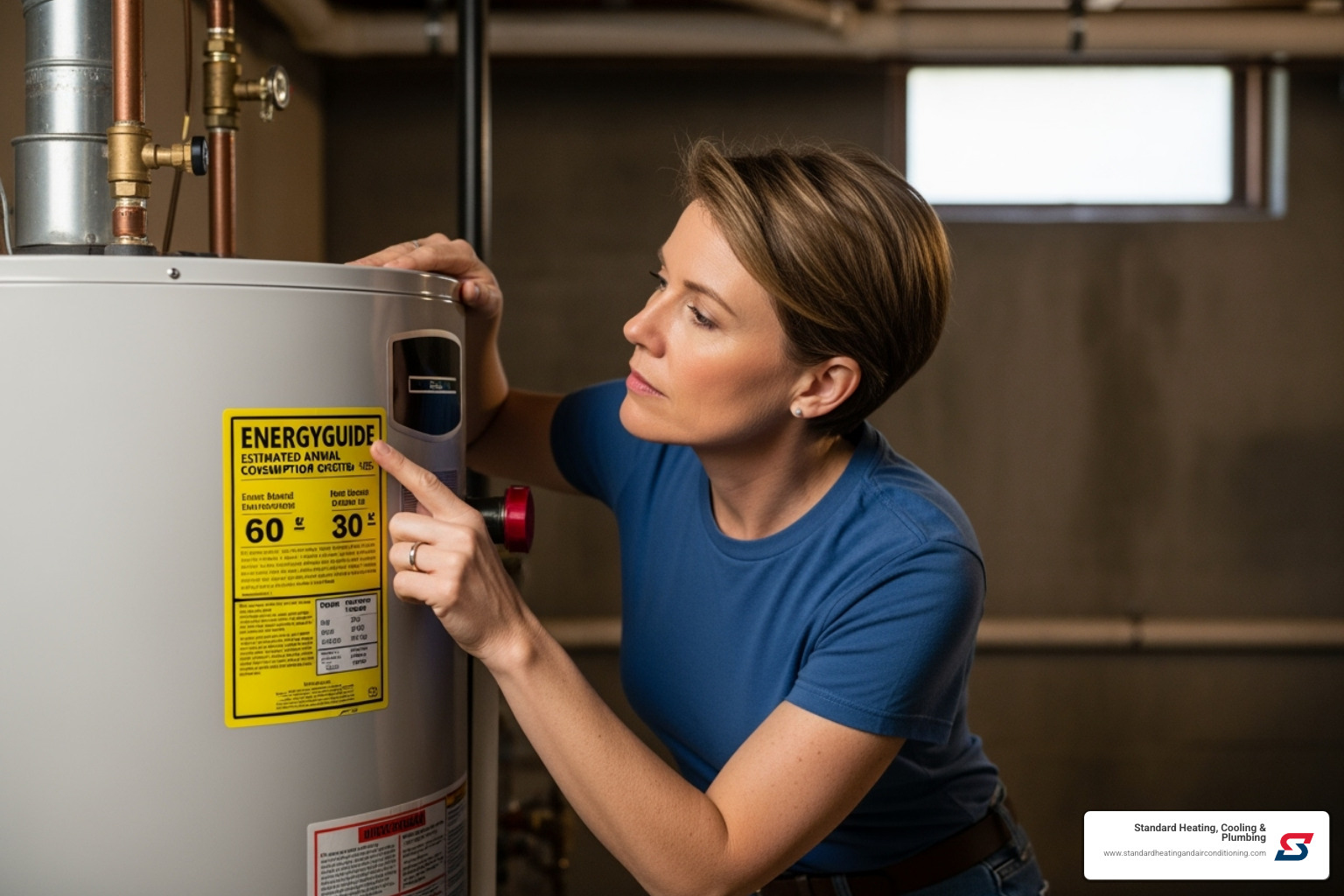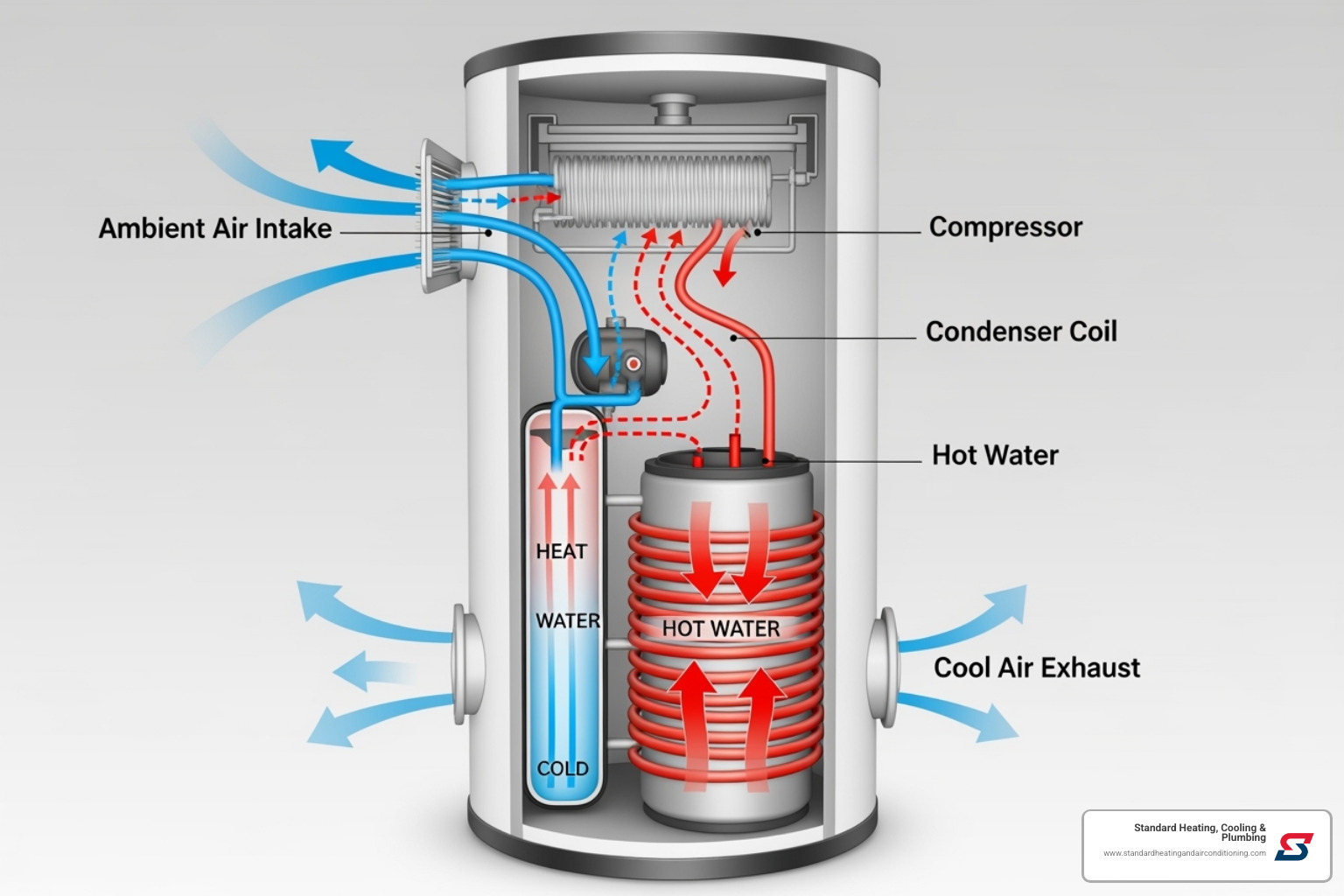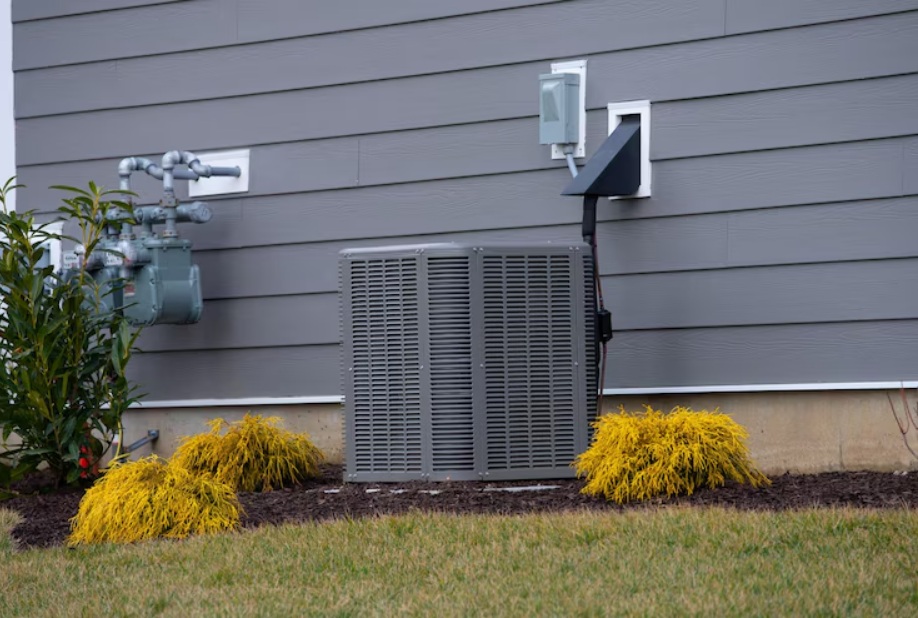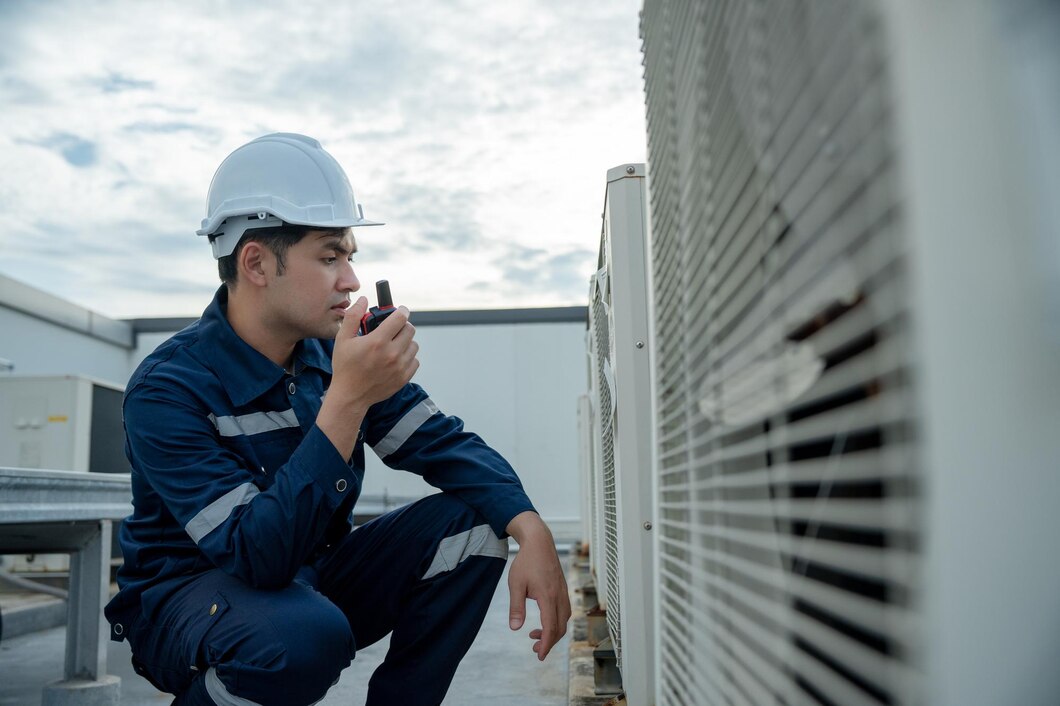Why Energy-Efficient Water Heaters Are Your Home’s Hidden Money Savers
An energy efficient water heater can cut your utility bills dramatically while providing reliable hot water. Water heaters represent 19.3% of total energy used in the average household, making them the second highest energy consumer in your home behind heating and cooling.
Here’s what you need to know about energy-efficient water heaters:
- Heat pump water heaters use up to 75% less energy than standard electric models
- Tankless water heaters can save 30% more energy compared to traditional storage tanks
- ENERGY STAR certified models can save a family of four approximately $600 per year
- Payback period is typically 2-3 years for most efficient models
- Federal tax credits up to $2,000 are available through December 31, 2025
Whether you’re replacing an aging unit or planning a proactive upgrade, understanding your options leads to significant long-term savings. The average American uses large amounts of hot water daily for showers, dishwashing, and laundry.
The key is choosing the right type and size for your home’s specific needs while maximizing available rebates and incentives.
Decoding Water Heater Types: Which is Right for You?
Choosing the right energy efficient water heater is about matching your home’s needs and budget. Let’s break down the main types to find your perfect fit.
First, consider the fuel types available in your home. Most homes in the Birmingham area use electricity and natural gas, though propane and solar are also options. Your available fuel type is a key factor, as converting from one to another can be expensive. We typically recommend working with your existing infrastructure.
Should you focus on upfront cost or long-term savings? We always recommend looking at the bigger picture. A cheaper unit with high running costs isn’t a true bargain.
Conventional Storage Tank Heaters
These are the most common water heaters, functioning like a large insulated thermos to keep a ready reservoir of hot water. Their main advantages are a lower upfront cost and immediate hot water delivery. However, they experience standby heat loss, constantly using energy to keep the stored water hot. Available in gas and electric models, they typically last 8 to 12 years. While electric models are highly efficient at converting energy to heat, gas is often the cheaper fuel in our area.
Pro tip: Insulating the water pipes near your storage tank can easily boost its efficiency.
Tankless (On-Demand) Water Heaters
Tankless models provide endless hot water by heating water directly as you need it, eliminating standby heat loss. These space-saving units mount on a wall and can last 20 years or more, with ENERGY STAR models saving 30% more energy than storage tanks. However, they have a higher upfront cost. Performance can be affected by cold groundwater temperatures, and they have flow rate limitations. Running multiple hot water appliances simultaneously may exceed the unit’s capacity.
Heat Pump (Hybrid) Water Heaters
Heat pump water heaters are the most efficient option, as they move heat rather than creating it. They pull warmth from the surrounding air and transfer it to the water, making them two to three times more efficient than standard electric models. An ENERGY STAR certified unit uses about one-quarter of the energy of a standard electric heater, saving a family of four around $600 annually. They also act as dehumidifiers, a great benefit in Alabama’s climate. However, they require about 700 cubic feet of surrounding air for proper operation, produce some noise, and need a drain for condensate.
Want to explore your options? Check out the ENERGY STAR Product Finder to see certified models.
Solar Water Heaters
Solar water heaters use the sun’s energy via collector panels on your roof, transferring heat to a storage tank. They can provide up to 60% of a home’s hot water needs but require a backup system for cloudy days. Their performance is highly dependent on climate. While they have the highest initial investment, they offer the lowest operating costs. Solar is a great long-term choice for those looking to minimize their environmental impact.
Your Checklist for Choosing the Perfect Energy Efficient Water Heater
Choosing the right energy efficient water heater is a long-term decision for your comfort and budget. The most important factor is getting the size right. An undersized unit means cold showers, while an oversized one wastes energy.
The First Hour Rating (FHR) is key. It tells you how many gallons of hot water the heater can supply in an hour of peak use. A family of four typically needs an FHR of 60-70 gallons. However, your specific peak demand—based on habits like simultaneous showers and appliance use—is what truly determines the right size.
Understanding Efficiency Ratings: UEF and ENERGY STAR
Efficiency ratings are crucial for predicting savings. The Uniform Energy Factor (UEF) is the primary rating; a higher UEF means better efficiency and lower bills. For the best performance, look for the ENERGY STAR label. These products are third-party tested to meet strict efficiency standards that exceed government minimums, ensuring proven performance and a smaller carbon footprint.
Why Choose an ENERGY STAR Certified Product?
ENERGY STAR certification isn’t just a sticker. It guarantees that a water heater has passed rigorous testing by independent labs to verify its performance and efficiency claims. For example, an ENERGY STAR certified heat pump water heater uses about one-quarter of the energy of a standard model. Choosing ENERGY STAR means investing in reliable technology that delivers proven savings and performance.
Simple Ways to Reduce Hot Water Consumption
You can boost your savings further by reducing hot water consumption. These simple changes work with any energy efficient water heater:
- Low-flow fixtures: Install low-flow showerheads and faucets to use less hot water without sacrificing pressure.
- Wash clothes in cold water: Modern detergents are effective in cold water, saving the energy needed to heat water for laundry.
- Take shorter showers: Cutting just a few minutes from each shower adds up to significant energy savings over a year.
- Insulate pipes: Wrap the hot water pipes near your water heater to prevent heat loss as water travels to your taps.
- Consider drain-water heat recovery: These systems capture heat from used shower water to preheat the cold water entering your heater, recycling energy.
The Champion of Efficiency: A Closer Look at Heat Pump Water Heaters (HPWHs)
Heat pump water heaters (HPWHs) are the champions of efficiency because they move heat instead of creating it, a far more effective method than traditional electric resistance. These units use hybrid technology, combining the high-efficiency heat pump with electric resistance elements for backup during high demand.
Modern HPWHs often include smart controls, such as Rheem’s EcoNet system, for mobile app management, scheduling, and vacation modes, further boosting savings.
Performance, Climate, and Your Home
An HPWH’s performance depends on its environment, with ideal operating temperatures above 38°F. While their efficiency drops in colder weather, the electric backup ensures a reliable hot water supply. For the mild climate in Birmingham, AL, HPWHs are an excellent choice, operating at peak efficiency for most of the year. They do produce some noise (similar to a refrigerator) and have a welcome dehumidifying effect, which is a bonus in humid Southern climates.
Key Installation Considerations for an energy efficient water heater
Proper installation is crucial for HPWH performance. Key requirements include:
- Space Requirements: They need about 700 cubic feet of surrounding air, making them ideal for basements, garages, or large utility closets.
- Airflow Needs: Good air circulation is essential; a louvered door may be needed for closet installations.
- Condensate Drain Line: A drain line is required to remove water produced during dehumidification.
- Location: The space should remain above 38°F for best performance.
- Electrical Requirements: Most units need a 240-volt connection.
Note: Never wrap an HPWH in an insulation blanket, as it blocks airflow.
The Best Savings of a Hybrid Model
The initial investment for a heat pump water heater can be higher than that of a conventional electric or gas water heater. However, the energy savings are so substantial that the payback period is remarkably short, typically around two to three years for a household of four. Over its lifetime, an HPWH can deliver over $4,500 in savings compared to a standard electric water heater. The Rheem ProTerra™ Hybrid Electric Water Heater, for example, uses up to 75% less energy than a standard electric water heater.
Let’s look at a comparison:
| Factor | Standard Electric Water Heater | Heat Pump Water Heater (HPWH) |
|---|---|---|
| Upfront Cost | Lower | Higher |
| Annual Savings | $0 (baseline) | ~$600 (for household of 4) |
| Lifetime Savings | $0 (baseline) | >$4,500 |
| Payback Period | N/A | ~3 years |
These significant savings make HPWHs an incredibly smart long-term investment for homeowners seeking to reduce their energy bills and environmental impact.
Opening Up Savings: Rebates and Tax Credits for Your Upgrade
Investing in an energy efficient water heater is more affordable than you might think. You don’t have to cover the full cost alone thanks to financial incentives from federal, state, and local programs, as well as utility companies. These programs make it easier to choose an efficient model and start saving money sooner.
Federal Tax Credits for Homeowners
The Inflation Reduction Act provides a generous federal tax credit for homeowners who install an ENERGY STAR certified heat pump water heater. You can claim 30% of the total project cost, up to a maximum of $2,000. This is a direct credit that reduces your federal tax liability. This incentive is available for systems installed through December 31, 2025, making now an excellent time to upgrade.
This credit has made high-efficiency models much more affordable for many Birmingham homeowners. Learn more about how the credits work here: Save with Tax Credits for Energy Efficiency (Video).
Finding Local Rebates and Assistance Programs
Beyond federal credits, you may find additional rebates from your state, local government, or utility company. Combining these can significantly lower your upfront cost. The best way to find local offers is the ENERGY STAR Rebate Finder—just enter your zip code.
Assistance programs are also available. The Weatherization Assistance Program (WAP) offers free energy improvements for qualifying households, while the Low Income Energy Assistance Program (LIHEAP) can help with home repair and upgrade costs. Always check with your local utility for their specific programs to maximize your savings on a new energy efficient water heater.
Frequently Asked Questions about Energy-Efficient Water Heaters
We’ve been helping Birmingham families with their water heating needs for 85 years. Here are the answers to the most common questions we get about energy efficient water heaters.
How long does an energy-efficient water heater last?
Lifespan depends on the type and maintenance. Regular maintenance is key to maximizing lifespan and efficiency.
- Conventional storage tank heaters: 8-12 years.
- Tankless water heaters: 20+ years with regular descaling, which is important in areas with hard water like Alabama.
- Heat pump water heaters: 10-15 years. ENERGY STAR models typically include at least a 6-year warranty.
Proper maintenance not only extends the life of your unit but also prevents unexpected breakdowns and keeps energy bills low.
Can I install an energy-efficient water heater myself?
While it may be tempting to DIY, we strongly recommend professional installation for several reasons:
- Safety: Installation involves complex plumbing, electrical, and/or gas connections. Mistakes can lead to dangerous leaks, electrical hazards, or water damage.
- Building Codes: A professional ensures the installation meets all local Birmingham building codes, which is crucial for safety and future home sales.
- Warranty Protection: Most manufacturer warranties are voided by DIY installation. Professional installation protects your investment.
- Performance: Proper installation is essential to ensure your new energy efficient water heater operates at its peak efficiency and delivers the expected savings.
What size energy efficient water heater do I need for my family?
Sizing isn’t just about household size; it’s about your hot water usage patterns. We use the First Hour Rating (FHR)—the amount of hot water a unit can produce in one hour—to match a heater to your family’s peak demand.
Here are some general guidelines for storage tank capacity:
- 1-2 people: 30-40 gallons
- 2-4 people: 40-50 gallons
- 4+ people: 50-80 gallons
For tankless models, we consider the flow rate (gallons per minute) needed to run multiple fixtures at once. During a consultation, we’ll analyze your family’s specific habits to recommend the perfect energy efficient water heater that provides reliable hot water without wasting energy.
Upgrade Your Comfort and Your Savings
Switching to an energy efficient water heater is one of the smartest investments for your home. You’ll lower your utility bills, improve your family’s comfort, reduce your carbon footprint, and potentially increase your home’s value. By upgrading your home’s second-largest energy user, you take control of your costs. Whether it’s a super-efficient heat pump water heater or an on-demand tankless model, modern technology is designed for savings and reliability.
At Standard Heating, Cooling & Plumbing, we’ve provided expert guidance to Birmingham families for 85 years. We understand Alabama’s climate and how it impacts your needs. Our team will help you choose the right type and size, steer rebates and tax credits, and ensure a safe, professional installation that meets all local codes.
With federal tax credits of up to $2,000 and payback periods as short as 2-3 years, there has never been a better time to upgrade. Don’t let an old water heater drain your budget.
Ready to upgrade your comfort and savings? For expert advice and professional water heater replacement in Birmingham, AL, contact us today! Let us show you how much you can save with the right energy efficient water heater.

